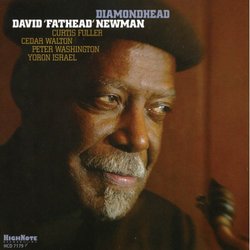| All Artists: David "Fathead" Newman Title: Diamondhead Members Wishing: 3 Total Copies: 0 Label: Highnote Original Release Date: 1/1/2008 Re-Release Date: 1/29/2008 Genres: Blues, Jazz, Pop Styles: Soul-Jazz & Boogaloo, Bebop Number of Discs: 1 SwapaCD Credits: 1 UPC: 632375717926 |
Search - David "Fathead" Newman :: Diamondhead
 | David "Fathead" Newman Diamondhead Genres: Blues, Jazz, Pop
|
Larger Image |
CD DetailsSimilarly Requested CDs |
CD ReviewsStellar! Steven Jay | Denver CO | 04/23/2008 (5 out of 5 stars) "Diamondhead is David "Fathead" Newman's seventh album in as many years for High Note. It was issued a few weeks short of his 75th birthday with his longtime collaborator and friend Houston Person as co-producer. The band assembled for this date is made up of longtime associates of the reedman; most of whom have actually appeared on his High Note releases. Fellow Texas native Cedar Walton is in the piano chair (virtually the same age, the pair attended the same high school but didn't play together until the '60s), and legendary trombonist Curtis Fuller is on the other horn -- he has known Newman and played with him since the '80s, as has bassist Peter Washington. Drummer Yoron Israel was instrumental in creating the great depth and breadth of Life, the last Newman offering on the label. This outing is very different. It is a solid jazz date with some wonderful post-hard bop and soul-jazz touches here. Standout tunes on this set include a beautiful, elegant, deeply soulful reading of Billy Joel's "New York State of Mind," with excellent solo work from Newman on flute, alto, and tenor, and Walton on piano. The title track is one of the harder swinging, blues oriented tunes Newman has written in a while, and Fuller's solo is popping. Walton's fills and comps around Newman's tenor are killer. The deep groove is pure Texas rhythm and blues by way of Hank Mobley and Ray Charles. Newman does a wonderful job of weaving these various sources into a single tight-knit composition. Walton's "Cedar's Blues" features some truly fiery work from both Fuller and the pianist, and Israel's slippery breaks may be subtle but they add the funky backdrop necessary for Walton's knotty line to breathe. There is a beautiful reading of the Hoagy Carmichael/Johnny Mercer standard "Skylark," that contains more of Mercer's beautiful melody than not, and Newman's tone is at its richest and most expressive despite the slow tempo of the tune. Two other Newman compositions, "My Full House," and "Mama-Lou" are also steeped in gospel and blues. The former could have been played by the Charles band except for one thing: there is a beautiful little Latin trace in Israel's rhythmic pulse that adds texture and space to this, making this mid-tempo blues not only prime for honking, but also for dancing. Fuller's solo is deep as well. Uh-huh. The latter cut is a killer showcase for the Newman flute. Ever since he took it up in the '60s, he's been a monster on the thing, and the way he and Walton interplay on the melody on this blues is killer. Washington's bass here is stellar as it covers the middle ground for Walton to begin his fat two-handed chord counter to Newman's solo. When he eventually moves to the right hand, he's moving about the middle register and turns the melody inside out with some humor tossed in via some playing around with quoting the "Mexican Hat Dance," and in the next chorus going right to Duke Pearson and Ramsey Lewis. This is a stellar little quintet date and offers living proof that Walton, Fuller, and Newman show no signs of slowing down. " Cookin' at 75 Samuel Chell | Kenosha,, WI United States | 11/30/2008 (4 out of 5 stars) "There are so few survivors left that it's easy to overlook David Fathood Newman, who deserves inclusion in any discussion of living giants--whether Rollins, Moody, or Jimmy Heath. At the same time, as someone less fully dedicated to the art of jazz during his stint with Ray Charles, he never developed as a comparable innovator, even if as a blues man he remains among the best. His tenor is assured and strong, without any "tough tenor" artifice added for effect, and his development on flute continues to impress with each passing year. He also performs credibly on alto, though his chops on the smaller saxophone have never been quite up to the standards expected of the best players since Bird. (His "Star Eyes" will no doubt sound better to anyone not familiar with Parker's recordings of the tune or with any number of the eloquent Stitt performances that have preceded it.)
Curtis Fuller is no longer the player he was on "Blue Trane" or on any number of Art Blakey sessions, but his tone is fuller and more "open" on the present session than on one he made almost ten years ago as the member of a Blakey alumni band. He and Fathead are clearly comfortable sharing front-line duties while a state-of-the-art rhythm section holds up its end. A number of the tunes are originals by Fathead, revealing him to be one of the more engaging composers in the business." |

 Track Listings (9) - Disc #1
Track Listings (9) - Disc #1
